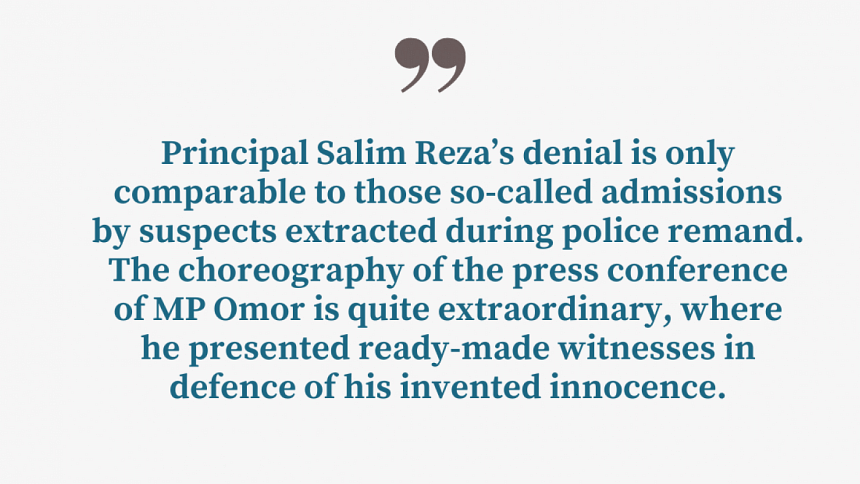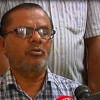Why should MPs have a role in school, college management?

It is hard to imagine the level of humiliation and agony Principal Salim Reza of Rajbari Degree College in Rajshahi has been forced to endure. First, he was assaulted, and then he was forced to issue a denial by the same person who assaulted him. It can only happen if the alleged perpetrator turns out to be so powerful that protesting an assault or defiance for telling the truth means losing what else the victim is left with, such as safety and dignity of other members of his family and his livelihood. Reports suggest that both the incidents took place at the same venue, the private chamber of the local MP Omor Faruk Chowdhury. Salim was assaulted by the MP in front of other principals of different colleges in his constituency. And the second event was so surreal that he had to read a prepared statement to the assembled press, sitting beside the same MP, denying his ordeal at the hands of the host.
Principal Salim Reza's denial is only comparable to those so-called admissions by suspects extracted during police remand. The choreography of the press conference of MP Omor is quite extraordinary, where he presented ready-made witnesses in defence of his invented innocence. One such witness was Abdul Awal, principal of Matikata Degree College, who, rather incriminating himself, said he and Salim were arguing about something when "I couldn't take a word he uttered during the argument and pushed him, and I am sorry for that." Following repeated questioning by journalists, Principal Awal, according to Prothom Alo, further added, "To control the situation, the member of parliament pushed me, and also pushed Principal Salim Reza." Principal Awal's desperate bid to whitewash MP Omor's alleged manhandling of Principal Salim Reza unwittingly establishes the fact that the MP indeed resorted to applying physical force, which is clearly not included in the lawmaker's job description.
The whole episode raises some serious questions regarding the roles of both the lawmaker and the college principals. Media reports quoted MP Omor asking journalists to give him back the reputation he had lost because of the assault allegations. But the lawmaker should know that, before sympathising with him, someone needs to know whether his behaviour was suitable to his office. If the reports saying that he was annoyed with Principal Salim for his failure to discipline a teacher for slandering him are correct, he should have taken the legal course for mitigation of his alleged suffering. No law permits him to summon the victim to his office and assume the roles of a prosecutor, judge and executioner. His rivals have alleged that, a few years ago, MP Omor had assaulted Principal Abdur Rahman of Godagari Government College over allegations of monetary dealings to get government grants. No action was taken against him then, but the principal lost his job in the following months.
What makes it obligatory for college teachers to maintain such close relations that require attending MPs' private offices? What makes one principal engage in heated exchanges with another, which ultimately becomes violent in the presence of a lawmaker? Do those principals belong to the ruling party? Otherwise, why have references of leadership contests in the local unit of the Awami League been made in the denial statement by Salim Reza? Teachers, too, need to come clean and tell us whether such humiliation is the result of their professional work or for political activism and becoming party to factional wars between rival groups within the ruling party?
An investigation into the incident has been initiated by the National University, which is the supervisory body of these colleges. Hopefully, those teachers who became accomplices – either voluntarily or through force – will face appropriate reprimand and penalties. But the biggest challenge the university probe body faces to conduct its investigation fairly is to get cooperation from MP Omor. Isn't it quite strange that neither the speaker, the guardian of the parliament, nor the ruling party has initiated any investigation and disciplinary procedure against the MP for harming the image of parliamentarians in general and bringing the party into disrepute?
Educational institutions have long been a very important tool for expanding political power and influence in Bangladesh. According to the government policy, the most important role in the formation of a school or college management body is that of the member of parliament in the area. Though their role is defined to be consultative, it would be difficult to find a single institution where the management committee has been formed without the approval (unofficial) of the local MP. Even in electing the representatives of teachers and parents, the MP's nominations prevail.

Forcing Acting Principal Swapan Kumar Biswas of Narail's Mirzapur United College to wear a garland of shoes is another example of how these factional wars of the ruling party are harming educational institutions. Though the Narail incident had a facade of religious sentiment, subsequent investigations by the media have found that local politics also played a part in it, over the appointment of principal. After these details came to light, the ruling Awami League also expelled one person from the local committee, a colleague of Swapan Kumar Biswas.
Many of us have forgotten how Shyamal Kanti Bhakta, headmaster of Piar Sattar Latif High School in Narayanganj's Bandar upazila, was humiliated and tortured in the presence of the local MP, Salim Osman. No action was taken against the lawmaker by the House speaker or his party, Jatiya Party. A criminal case filed by the victim was discharged by a court in Dhaka for lack of proof.
Establishing control on schools and colleges has become crucial for parliamentarians for various reasons, including the role teachers play during elections as polling officers for the Election Commission. It's about time we rethought the MPs' consultative role in constituting management committees in our schools and colleges. Protecting teachers' dignity and rights is an issue of changing our political culture too.
Kamal Ahmed is an independent journalist and writes from London, UK. His Twitter handle is @ahmedka1

 For all latest news, follow The Daily Star's Google News channel.
For all latest news, follow The Daily Star's Google News channel. 









Comments